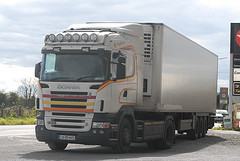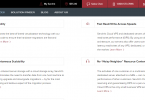 Logistics are the backbone of most firms. They ensure that products and services are delivered in a timely fashion and keep the whole business ticking over. As logistics are such a vital part of a business, it is important that they are both efficient and cost effective.
Logistics are the backbone of most firms. They ensure that products and services are delivered in a timely fashion and keep the whole business ticking over. As logistics are such a vital part of a business, it is important that they are both efficient and cost effective.
There are many ways in which logistics can waste a firm’s money, but also there are many ways which money can be saved. These range from voice picking, to asset labelling and tracking of goods.
Vehicle tracking systems and Radio Frequency Identification Devices (RFID’s) are both ways of keeping track of your fleet.
They both track where each vehicle is in real time, via the use of GPS signals. The data that these systems can provide give companies the potential to become more efficient and save money at the same time.
Wireless Matrix is one business who specializes in providing GPS tracking to commercial fleets.
For example, they allow firms to observe the route that each vehicle takes on each particular trip. This information can then be used to see if the drivers are choosing either quickest or the most economical route.
By using the most economical route possible then the company will save both in terms of fuel costs, and as well as this they will also reduce their carbon emissions.
![]() These devices can also be used to monitor driving styles over time. Some drivers may have developed bad habits which waste fuel without even noticing, and RFID’s and tracking systems enable them to identify these issues, and offer new training to those drivers who don’t realise they costing the company excess money.
These devices can also be used to monitor driving styles over time. Some drivers may have developed bad habits which waste fuel without even noticing, and RFID’s and tracking systems enable them to identify these issues, and offer new training to those drivers who don’t realise they costing the company excess money.
Another valuable benefit of systems such as these is the issue of drivers driving for too long without breaks. By law, drivers of heavy goods vehicles must take a break from the wheel every four and a half hours, for at least forty five minutes at a time. Failure to do so increase tiredness at the wheel and the possibility of accidents and crashes increases exponentially.
It is now possible for managers to see how long each driver has been driver for at one time, and avoid any drivers exceeding the time they are allowed to stay at the wheel for.
Trackers can also be used to ensure that stock inventories are kept at an optimum level by storing information on their length of time in storage and their overall sales history. This is especially useful for those that transport perishable goods.
In the same way, RFID trackers can be used to help track vans through radio communicated signals. Van tracking is an excellent way to make large freight vehicle or smaller van deliveries more efficient. By ensuring that vehicles and their goods are properly tracked from a warehouse to their delivery, a business can reduce levels of acceptable loss and raise overall performance levels.
Moreover, RFID software can be used to record successful deliveries, and to report any recurring problems in terms of transportation. Having these tracking devices in place ultimately means that a self-employed business can better monitor and improve efficiency and long term profit margins.
Therefore, through the use of vehicle tracker systems and RIFD’s, companies can improve their efficiency, reduce their levels and waste, cut costs and as a result, see profits increase, in addition to the lowering carbon emissions and helping reduce dangerous accidents.





Leave a Comment